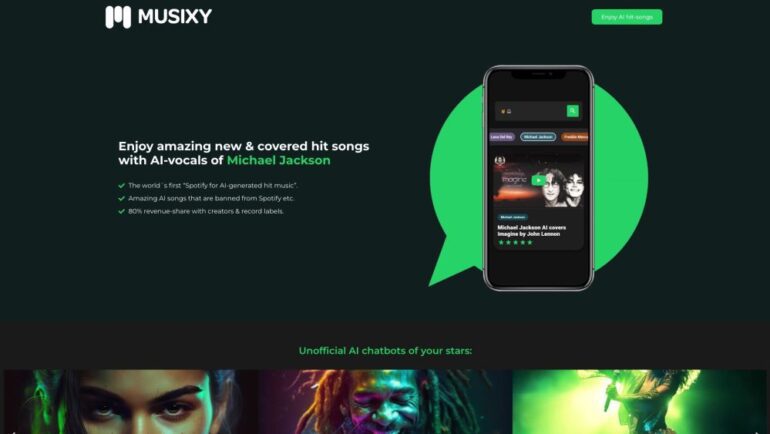TL;DR:
- AI’s impact on the music industry raises concerns about intellectual property.
- Musixy, a new platform, focuses exclusively on AI-generated music.
- Major labels fear revenue losses due to AI’s disruptive potential.
- Musixy aims to become the “Spotify for AI hit songs.”
- The platform collaborates with Ghostwriter on AI-generated tracks featuring famous artists.
- Grammy eligibility and recognition for AI-generated music are in discussion.
- The CEO suggests marking AI vocal tracks as “unofficial” to avoid confusion.
- Negotiations are ongoing for a tool to create AI tracks legally with artists’ likenesses.
Main AI News:
Artificial intelligence (AI) has cast a profound influence across diverse sectors on a global scale. Nevertheless, the tension between its utility and the potential infringement of intellectual property (IP) rights has emerged as a poignant challenge within the creative realms.
Prominent stakeholders in the music domain, spanning from musicians and record labels to venerable institutions such as the Grammys and YouTube, have all found themselves contending with the pervasive influence of AI in varying capacities.
As the traditional bastions of the music industry grapple with the inexorable march of technology, innovative platforms are swiftly emerging. One such trailblazer, Musixy, made its debut on September 14th, positioning itself as a multifaceted streaming platform, record label, and music marketplace exclusively dedicated to AI-generated compositions.
Cointelegraph engaged in a candid conversation with Can Ansay, the ingenious founder and CEO of Musixy, in order to gain deeper insights into how carving a distinct niche for AI-forged music might sculpt the future of the music industry.
Musixy aspires to claim the mantle of the “Spotify for AI chart-toppers,” particularly those compositions that have faced rejection on other platforms. Over the past year, major streaming giants like Spotify have intensified their vigilance, prompted by Universal Music Group’s directive to bolster their policing of copyrighted AI-generated tracks.
Ansay expounded, likening the current apprehension within the establishment—comprising major labels—to the turmoil witnessed during the Napster era, as they grapple with the specter of revenue erosion brought about by disruptive technological advances.
He contended that AI bestows “talented producers” with the power to craft and monetize chart-topping hits featuring the voices of renowned artists in any language. Musixy, in particular, accentuates the creation of fresh compositions and covers, incorporating AI-generated vocal renditions of well-known artists.
Notably, Musixy collaborates with Ghostwriter, the mastermind behind a viral sensation, a track generated by AI vocal overlays of Drake and the Weeknd, titled “Heart on My Sleeve.” Initially considered a potential Grammy contender, the Recording Academy’s CEO later clarified its ineligibility for nomination. This underscored the absence of requisite permissions from the artists or labels for employing their vocal likenesses.
Ansay articulated that if Musixy attains recognition as a bona fide streaming platform by the Recording Academy, it could herald a watershed moment where these remarkable AI-augmented compositions rightfully secure the Grammy accolades they richly deserve, all produced with AI’s creative assistance.
“This is particularly pertinent for compositions that unofficially incorporate AI-assisted renditions of renowned singers, ones that were unceremoniously blacklisted from all recognized streaming platforms,” he emphasized.
Ansay further contended that, from a legal standpoint, vocal resemblances are not inherently “protectable,” as this would contravene professional ethics and impede artists with voices akin to their more illustrious counterparts.
Instead, he proposed the labeling of AI vocal tracks as “unofficial” to avert any potential confusion. Recent reports indicate that Google and Universal Music Group have been engaged in negotiations regarding a tool that could facilitate the legitimate creation of AI-generated tracks using artists’ likenesses.
When posed with the question of whether AI-forged music should vie for awards and recognition on equal footing with traditional compositions or carve out its distinct category, Ansay asserted that both approaches bear merit.
“To realize this, one must, within the purview of the Grammys’ rules and regulations, distinctly define the roles AI plays in music production and to what extent,” he noted. Alternatively, he advocated for the establishment of a new category, such as “AI Song of the Year,” or a comparable designation, citing the Grammys’ stated mission to celebrate excellence in the realm of ‘science.’
Conclusion:
Musixy’s entry into the music industry signifies a significant disruption driven by AI technology. Traditional players must navigate copyright concerns and adapt to the changing landscape. The potential recognition of AI-assisted music at prestigious events like the Grammys may reshape industry dynamics and create new opportunities for innovation and recognition.

